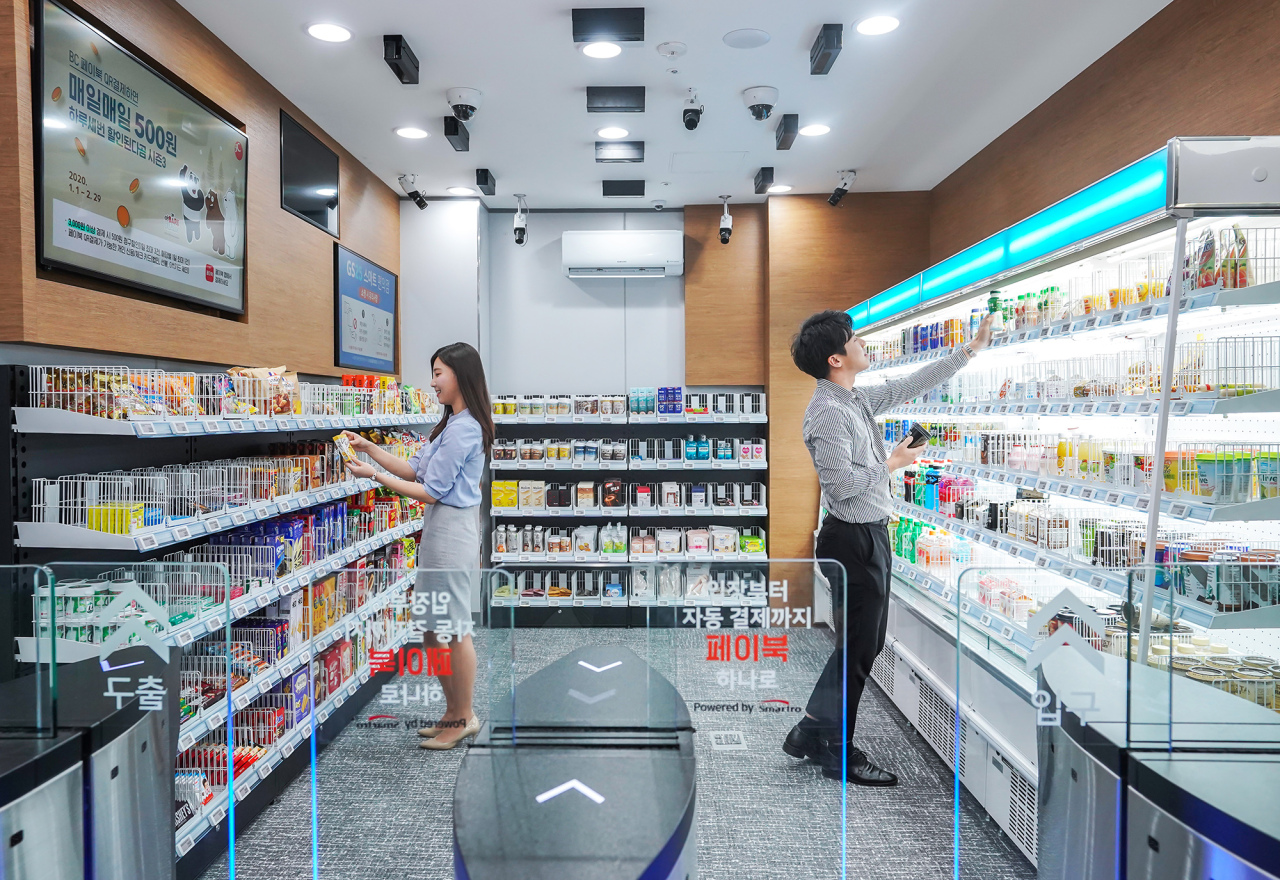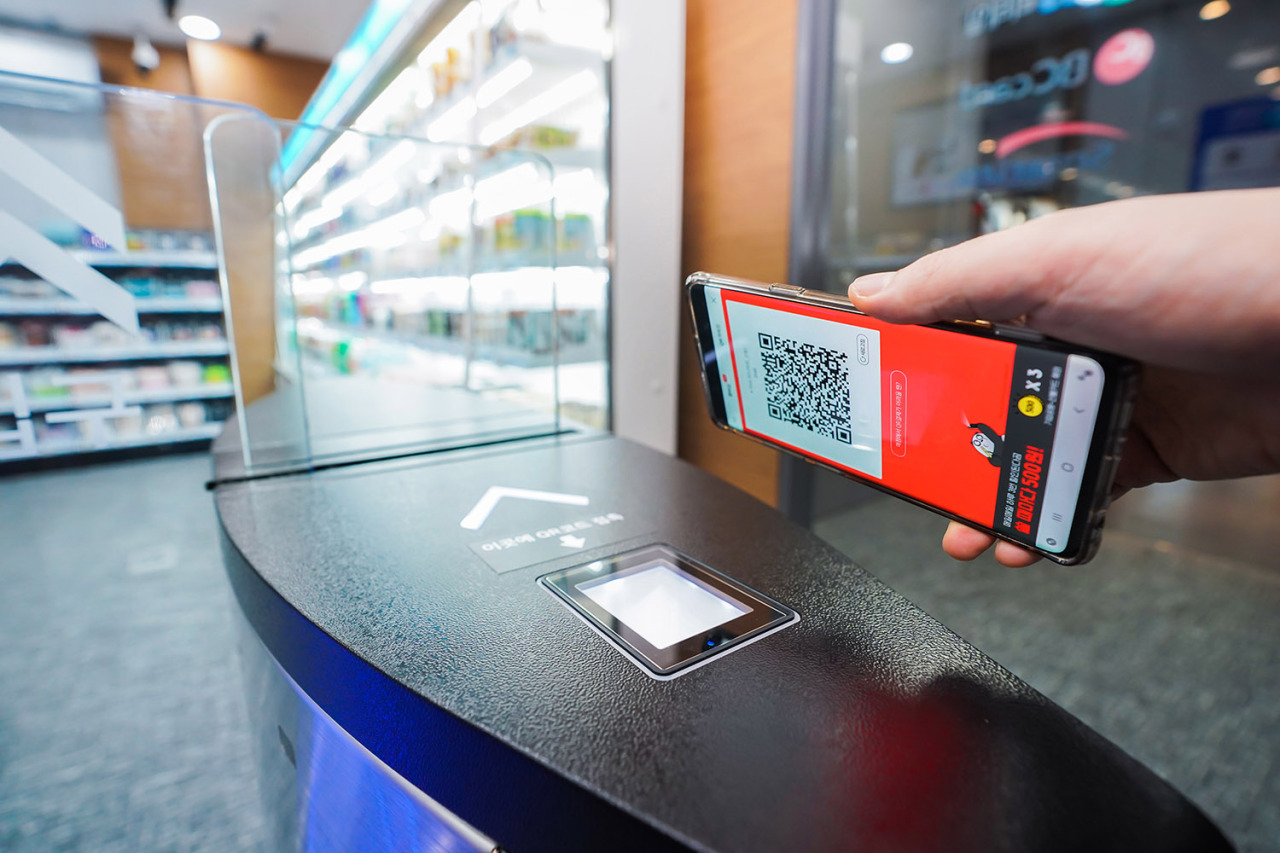Cashier-less tech on the rise
BC Card’s experiment of contactless payment system for autonomous convenient store draws market attention
By Kim Young-wonPublished : March 1, 2020 - 14:56

Just grab and go. This is what customers visiting a convenience store at BC Card’s head office in Seoul have to do. They don’t need a wallet, credit cards or cash.
They don’t even have to encounter any cashier for payment. It is run autonomously, replacing human labor with the latest technology that features state-of-the-art sensors to track customers’ movements, and the weight of products on shelves.
The convenience store, jointly operated by BC Card, its affiliated payment services firm Smartro, and retail giant GS Retail, is one of the trailblazers in the domestic market for emerging checkout-free technology.
After scanning a QR code to enter the store, customers pick up products of their choice -- be it a carton of chocolate milk or a face mask -- and just walk past an automated gate. The rest is all handled automatically without having to taking out the wallet while holding shopping items or lining up at the checkout counter. The payment is automatically processed via the company’s mobile payment application Paybooc as soon as the customers walk out of the store.
“At this convenience store, which is a pilot project and only open to BC Card employees now, we are conducting a series of tests to find out technical errors in tracking customers’ movements and detecting abnormal activities or wrongdoings like shoplifting,” said Park Jae-eun, senior manager at the card firm’s synergy team who is in charge of coordinating the project.
On the ceiling of the 19.8 square meter store, a total of 34 sensing devices, including 22 smart cameras and 10 surveillance cameras, are installed to track customers from their entry to exit. Park said even a much larger store can be supervised with fewer cameras since a higher ceiling allows the motion-detection cameras to have a wider view angle.
In order to improve the detection capability, engineers from BC Card and Smartro have been running some “extreme experiments,” such as a customer shopping groceries while holding an open umbrella inside the store. A BC Card executive, in another case, stormed out of the store with items hidden in his jacket pockets while an employee inside the store passed an item to one of his colleagues standing across the gate. Without exception, the sensing devices were able to detect most of the unusual shopping activities and have the payment processed via the shoppers’ mobile payment app.
“The artificial intelligence-fitted control system keeps learning and evolving for better detection through deep learning technology,” said Park.
Weight sensors installed in the shelves also help ensure accuracy, she explained. When an item is lifted from the shelves, the sensor detects the change in weight -- it can sense as little as 15 grams -- and relay that data to the AI-powered central system running in the cloud-computing system. When leaving the store, customers receive digital receipts on their Paybooc app, which shows the details of the purchases, including the item names, prices, date, and order number.

Such data are expected to be utilized to offer customized services later when the cashier-less store is commercialized.
On privacy concerns, the company said personal data collected by the store is encoded so that items and customers who purchased them are not identified.
Such grab-and-go shopping experience is a popular concept among not only technology and retail companies but also payment firms here and abroad. It has received much attention from the public as consumers prefer non-face-to-face interactions amid the outbreak of diseases like the novel coronavirus.
Cost wise, setting up such checkout-free store is much cheaper than an Amazon Go cashier-less convenience store run by US tech giant Amazon since 2018 in the US because the latter requires more number of camera sensors, according to Park. She, however, did not give the exact details about the cost for establishing the autonomous store.
“Since the cashier-less technology paired with the Paybooc app can be deployed in stores in any size, it will help small supermarkets or mom-and-pop stores be able to operate around the clock without much difficulty,” said Kim Seong-soo, a spokesperson of the card firm.
The Paybooc app, which supports QR code payment, is currently available at 70,000 stores, shops and restaurants across the nation. It can be also used at street stalls and small shops in the Euljiro, central Seoul. The payment volume via the app jumped from 980 billion won ($805 million) in 2017 to 1.17 trillion won in 2019, according to BC Card.
By Kim Young-won (wone0102@heraldcorp.com)










![[Today’s K-pop] BTS pop-up event to come to Seoul](http://res.heraldm.com/phpwas/restmb_idxmake.php?idx=644&simg=/content/image/2024/04/17/20240417050734_0.jpg&u=)
![[Graphic News] More Koreans say they plan long-distance trips this year](http://res.heraldm.com/phpwas/restmb_idxmake.php?idx=644&simg=/content/image/2024/04/17/20240417050828_0.gif&u=)
![[KH Explains] Hyundai's full hybrid edge to pay off amid slow transition to pure EVs](http://res.heraldm.com/phpwas/restmb_idxmake.php?idx=644&simg=/content/image/2024/04/18/20240418050645_0.jpg&u=20240419100350)




![[KH Explains] Hyundai's full hybrid edge to pay off amid slow transition to pure EVs](http://res.heraldm.com/phpwas/restmb_idxmake.php?idx=652&simg=/content/image/2024/04/18/20240418050645_0.jpg&u=20240419100350)

